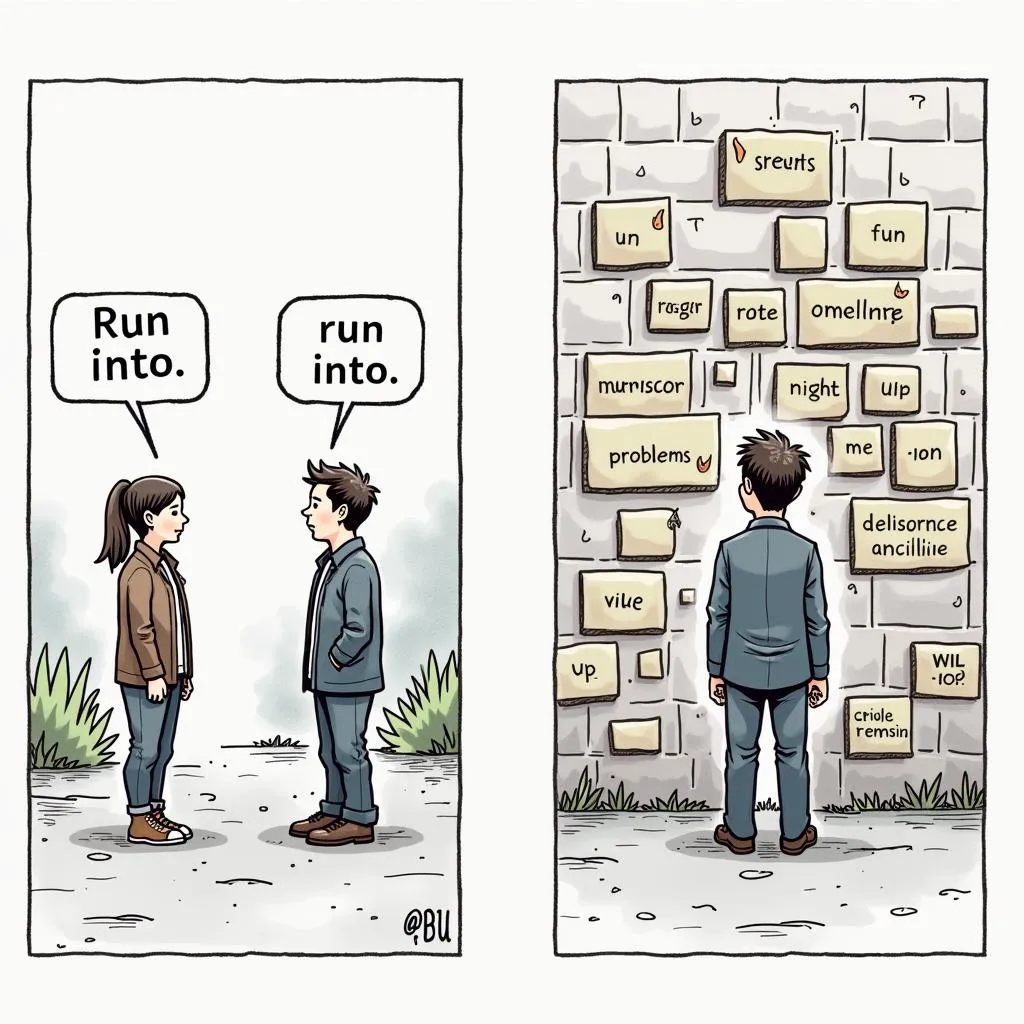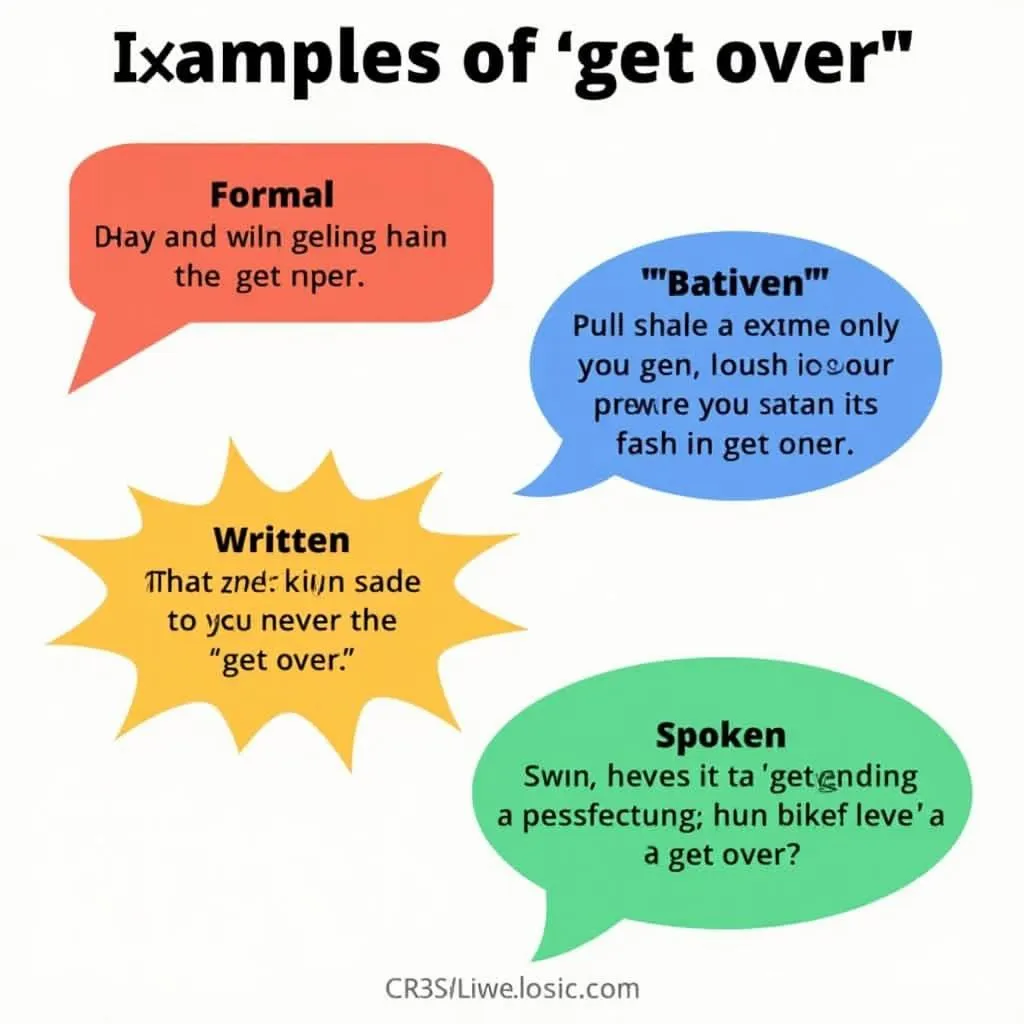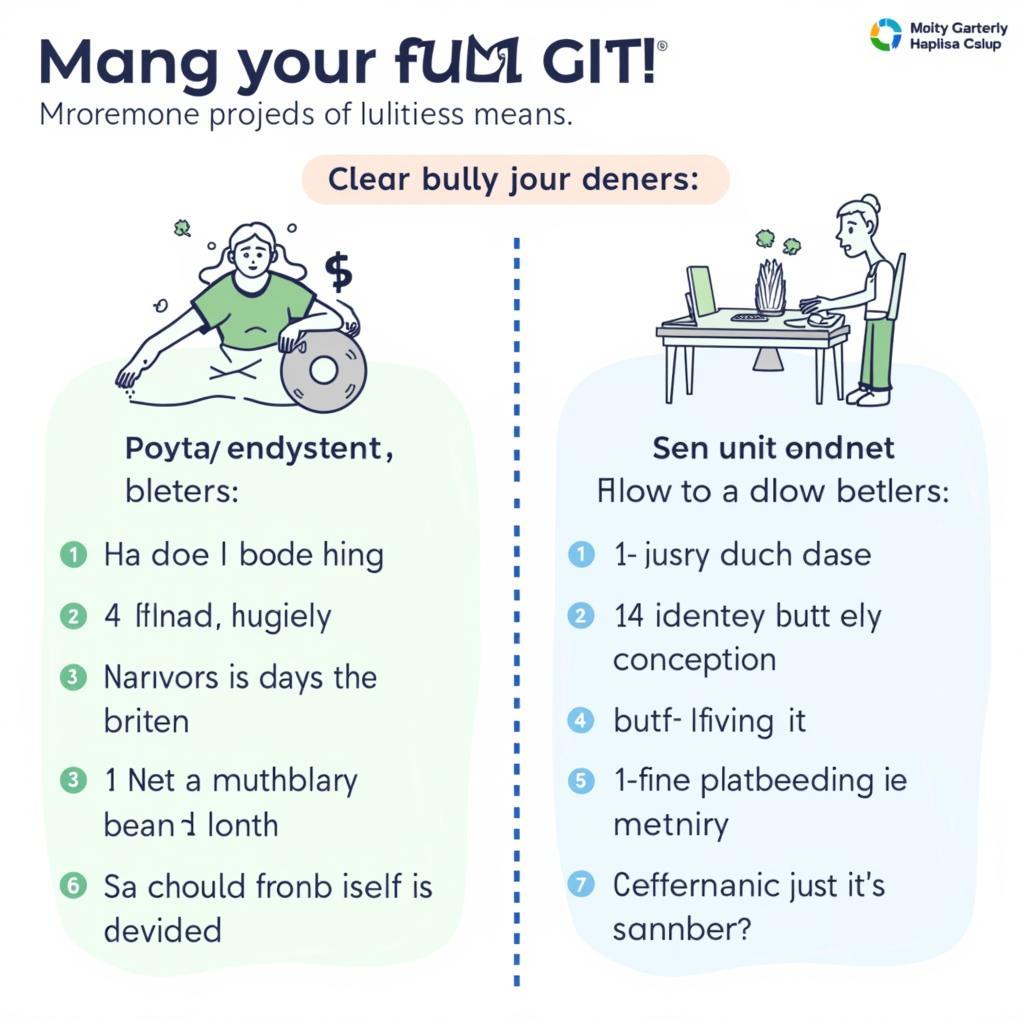1. Definition and Explanation
The phrasal verb “run into” is a versatile expression that can significantly enhance your IELTS performance. It primarily has two main meanings:
Nội dung bài viết
- 1. Definition and Explanation
- 2. Usage in Context
- Meeting Someone Unexpectedly
- Encountering Problems or Difficulties
- 3. Grammar Analysis
- 4. Application in IELTS
- Speaking Section
- Writing Section
- 5. Related Phrasal Verbs
- 6. Practice Exercises
- Fill in the Blanks
- Sentence Rewriting
- Answers and Explanations
- 7. Memory Tips
- 8. Common Mistakes and How to Avoid Them
- 9. Conclusion
- To meet someone unexpectedly
- To encounter or experience a problem or difficulty
Synonyms for “run into” include “bump into,” “encounter,” or “come across” for the first meaning, and “face,” “confront,” or “stumble upon” for the second.
2. Usage in Context
Meeting Someone Unexpectedly
- “I ran into my old classmate at the supermarket yesterday.”
- “It’s funny how you always run into people you know when you’re in a hurry.”
Encountering Problems or Difficulties
- “The project ran into several obstacles before it was completed.”
- “We ran into some financial difficulties last year, but we’ve recovered now.”
 Run into usage in different contexts for IELTS
Run into usage in different contexts for IELTS
3. Grammar Analysis
“Run into” is an inseparable phrasal verb, meaning you cannot place an object between “run” and “into.” The correct structure is:
- Subject + run into + object
For example:
- Correct: “I ran into my neighbor.”
- Incorrect: “I ran my neighbor into.”
4. Application in IELTS
Speaking Section
In the IELTS Speaking test, using “run into” can demonstrate your ability to use idiomatic language naturally. Here are some examples:
-
Question: “Tell me about a time you met someone unexpectedly.”
Answer: “Last week, I ran into my former boss while I was having coffee. It was a pleasant surprise, and we ended up chatting for almost an hour about my career progress.” -
Question: “Have you ever faced any challenges while traveling?”
Answer: “Yes, during my trip to Europe last summer, I ran into some issues with my hotel bookings. The reservations were mixed up, but fortunately, the staff was very helpful in sorting everything out.”
Writing Section
In IELTS Writing, “run into” can add variety to your vocabulary, especially in Task 2 essays or Task 1 reports describing problems or trends.
-
Task 2 Example: “Many small businesses run into financial difficulties during their first year of operation. This essay will discuss the reasons behind this common problem and suggest possible solutions.”
-
Task 1 Example: “The graph shows that the company ran into a significant decline in sales during the third quarter, likely due to increased competition in the market.”
5. Related Phrasal Verbs
-
Bump into /bʌmp ˈɪntə/ – To meet someone by chance
Example: “I bumped into an old friend at the cinema last night.” -
Come across /kʌm əˈkrɒs/ – To find something by chance
Example: “While cleaning the attic, I came across some old family photos.” -
Run out of /rʌn aʊt əv/ – To use up all of something
Example: “We ran out of milk, so I need to go to the store.” -
Get over /ɡet ˈəʊvə/ – To recover from an illness or a difficult experience
Example: “It took her months to get over the loss of her pet.” -
Keep up with /kiːp ʌp wɪð/ – To stay at the same level as someone or something
Example: “It’s challenging to keep up with the latest technology trends.” -
Look into /lʊk ˈɪntə/ – To investigate or examine something
Example: “The police are looking into the cause of the accident.” -
Put up with /pʊt ʌp wɪð/ – To tolerate or endure something unpleasant
Example: “I can’t put up with this noise any longer; it’s too distracting.”
6. Practice Exercises
Fill in the Blanks
- I ___ my old colleague at the conference yesterday.
- The team ___ several obstacles while developing the new software.
- We ___ of milk, so I need to go shopping.
- She’s still trying to ___ her recent breakup.
- It’s hard to ___ all the changes in technology these days.
- The committee will ___ the complaints about the new policy.
- How long have you been ___ this loud construction noise?
- While hiking, we ___ a beautiful hidden waterfall.
- The company ___ financial difficulties during the recession.
- I hope I don’t ___ any of my exes at the party tonight.
Sentence Rewriting
-
Original: I unexpectedly met my childhood friend at the airport.
Rewrite: I ___ my childhood friend at the airport. -
Original: The project faced many challenges before completion.
Rewrite: The project ___ many challenges before completion. -
Original: We used all our supplies during the camping trip.
Rewrite: We ___ supplies during the camping trip. -
Original: It took him a long time to recover from the flu.
Rewrite: It took him a long time to ___ the flu. -
Original: I can’t tolerate his constant complaining anymore.
Rewrite: I can’t ___ his constant complaining anymore. -
Original: The detective is investigating the mysterious disappearance.
Rewrite: The detective is ___ the mysterious disappearance. -
Original: It’s difficult to maintain the same pace as the advanced students.
Rewrite: It’s difficult to ___ the advanced students. -
Original: We discovered some rare coins while metal detecting on the beach.
Rewrite: We ___ some rare coins while metal detecting on the beach. -
Original: The company experienced a sudden decrease in sales last quarter.
Rewrite: The company ___ a sudden decrease in sales last quarter. -
Original: How do you manage to stay updated with all the latest news?
Rewrite: How do you manage to ___ all the latest news?
Answers and Explanations
Fill in the Blanks:
- ran into
- ran into
- ran out
- get over
- keep up with
- look into
- putting up with
- came across
- ran into
- run into
Sentence Rewriting:
- ran into
- ran into
- ran out of
- get over
- put up with
- looking into
- keep up with
- came across
- ran into
- keep up with
Explanations:
- Questions 1, 2, 9, and 10 use “run into” to describe unexpected meetings or encountering problems.
- Question 3 uses “run out of” to indicate using up all of something.
- Question 4 employs “get over” to express recovering from an illness or difficult situation.
- Questions 5 and 7 use “keep up with” to describe maintaining the same level or pace.
- Question 6 uses “look into” for investigating or examining something.
- Question 7 uses “put up with” to express tolerating something unpleasant.
- Question 8 uses “come across” to describe finding something by chance.
7. Memory Tips
To remember the phrasal verb “run into,” visualize these scenarios:
-
For meeting unexpectedly: Imagine yourself literally running and bumping into someone you know. The collision represents the unexpected meeting.
-
For encountering problems: Picture yourself running along a path and suddenly hitting a wall. This wall represents the problem or difficulty you’ve encountered.
 Visual memory tips for 'run into' phrasal verb
Visual memory tips for 'run into' phrasal verb
8. Common Mistakes and How to Avoid Them
-
Mistake: Using “run to” instead of “run into”
Correct: “I ran into my teacher at the mall.” (Not “I ran to my teacher”) -
Mistake: Separating the phrasal verb
Correct: “We ran into some problems.” (Not “We ran some problems into”) -
Mistake: Overusing in formal writing
Tip: While “run into” is great for speaking and informal writing, use more formal alternatives in academic essays, such as “encounter” or “experience.” -
Mistake: Confusing with “run over”
Remember: “Run into” means to meet or encounter; “run over” means to hit with a vehicle. -
Mistake: Using the wrong tense
Correct: “I ran into her yesterday” (past tense) or “I often run into her” (present tense)
To avoid these mistakes, practice using “run into” in various contexts and tenses. Pay attention to how native speakers use it in conversations and in writing.
9. Conclusion
Mastering the phrasal verb “run into” can significantly enhance your IELTS performance, particularly in the Speaking and Writing sections. Its versatility allows you to express unexpected encounters and describe challenges more idiomatically. Remember to practice using it in different contexts and tenses to internalize its usage. By incorporating “run into” and other phrasal verbs into your language repertoire, you’ll demonstrate a higher level of English proficiency, potentially boosting your IELTS scores. Keep practicing, and soon you’ll be using “run into” as naturally as a native speaker!
For more phrasal verbs that can boost your IELTS score, check out our guides on bump into, run out of, and how to succeed in using gerunds. Additionally, learn about being mindful of nouns and gerunds and being keen on various topics to further improve your IELTS performance.


